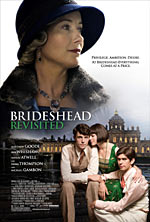Movies
Brideshead Revised

Nearly every review of the new film adaptation of Brideshead Revisited has referenced the landmark 1981 miniseries produced for British television starring Jeremy Irons, John Gielgud, Claire Bloom, and Laurence Olivier. With good reason: the 11-hour adaptation of Evelyn Waugh’s novel is an obvious entry into the canon of Modern Classics, with its stellar cast, lyrical script, and sumptuous locations, setting a very high water mark for any future page-to-screen Waugh adaptations. The recent movie remake boasts a few powerhouses of its own, including Emma Thompson and Michael Gambon as the heads of the wealthy Roman-Catholic family, the Marchmains, for example, but the critical consensus among top critics is as follows: if you have a couple of weeks, read the book; if you have a couple of days, watch the miniseries; if you have only a few hours…well, maybe start the book?
Ever the contrarian, Anthony Gottlieb of Intelligent Life is arguing in favor of the new movie’s liberties with the source material—playing up the homosexual subtext, playing down the Catholic context. Not content to argue that the changes to the book help streamline and clarify the film, Gottlieb argues that the new film is actually better in some ways than the book… mostly because the changes bring the film closer in line with Gottlieb’s own beliefs. For example, one major character doesn’t end up converting to Catholicism in the film, which in the book (and the faithful miniseries) was a plot point essential to Waugh’s theme: God’s infinite grace operating mysteriously in human lives. For Gottlieb, this happens in the book without ‘rhyme or reason’ and such a deus ex machina (the conversion experience) is ‘the antithesis of literary craft.’ He completely misses how Waugh’s subtle portrayal of religious faith is informed by his acute sense of the fallen human condition: those who appear most pious may be the novel’s gravest sinners, while those who appear most fallen (from a worldly point-of-view), may be the novel’s greatest saints. And those who don’t seek or want God’s grace may prove the rather stunned recipients of it.








By Debra Murphy AT 09.18.08 05:01PM Not Rated
The BBC mini-series also had a heartbreaking performance by Anthony Andrews as Sebastian—-more, indeed, than just a pretty face!
The film hasn’t come to my hometown yet, but according to Roger Ebert, it portrays the chill coming on Charles’ and Sebastian’s friendship when Sebastian allegedly sees that Charles, rather than being lured into the controlling penumbra of Lady Marchmain (and the whole Marchmain aura), as goes Waugh’s story, is falling in love with his sister—-IOW, personal romantic jealousy rather than Waugh’ much larger “contra mundum” attitude which Sebastian has towards his family, and family religion. I mean, what’s up with that?
On the upside, I saw the 25th anniversary edition of the BBC miniseries in Costco, of all places, so the film should at least send some people back to the book and faithful/gorgeous BBC version.
But I’ll see the film, first chance I get, if for no other reason than to see the wonderful Patrick Malahide as Ryder’s father!